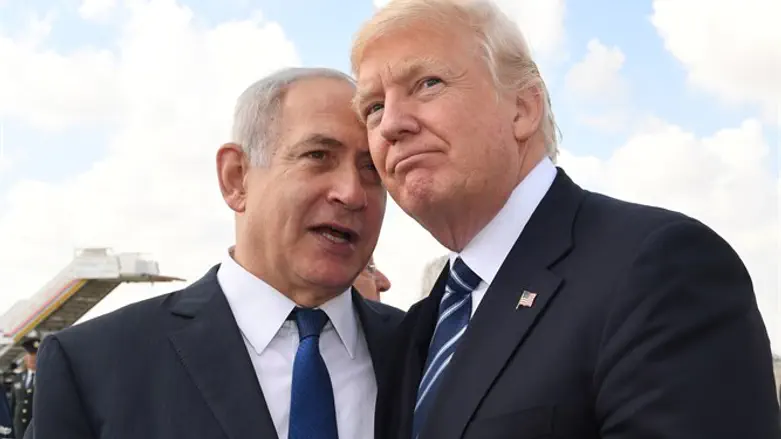
If israel's elections had been held last week, the meteoric new party – at least up until last week - headed by former MK David Levy's daughter, Orli Levy, would probably not even have passed the electoral threshold. The Kulanu party would also lose seats. Current Defense Minister Avigdor Liberman and his Yisrael Beytenu party would be back in the limelight. And the Likud? Netanyahu's party would reap the lion's share of this past week's harvest.
While not based on the results of a proper survey, the above estimates are based on my longtime, thorough familiarity with the Israeli political scene. And, in my opinion, if the elections were to be held this coming Tuesday, a day after the US Embassy dedication, the resulting scenario would be even more extreme.
Trump's bowing out of the Iran nuclear deal along with the tense security situation up north, leaves room for one and only one central topic on the political agenda – security. When it comes to that subject, it is really tough and probably impossible to rival Binyamin Netanyahu.

Any attempt to describe the magnitude of the victory scored by the PM this week will not do it justice. Any attempt to describe the magnitude of the victory scored by the PM this week will not do it justice. This is the man presented all over Europe as exaggerating the extent of the Iranian nuclear program, the man presented as a hysterical panic-monger by former heads of Israel's own security system, their accusations adopted unhesitatingly by the Knesset Opposition. And then POTUS appears and sounds as if he is speaking straight out of Netanyahu's mouth .
Any attempt to describe the magnitude of the victory scored by the PM this week will not do it justice. This is the man presented all over Europe as exaggerating the extent of the Iranian nuclear program, the man presented as a hysterical panic-monger by former heads of Israel's own security system, their accusations adopted unhesitatingly by the Knesset Opposition. And then POTUS appears and sounds as if he is speaking straight out of Netanyahu's mouth .
Had Trump not mentioned that Israeli Intelligence exposed secret documents from Iran's nuclear archive, one could have thought that Netanyahu was doing the talking. The choice of language was similar, as were the mantras, and Netanyahu achieved the result he had been striving for from the minute he found that there was rapport between him and the president of the most powerful nation in the world.
Naturally, Trump has his own interests, first among them the desire to return to being the most effective deterrent force on the international scene, to show that when America threatens, it follows through. Also, that sometimes promises are kept, sooner or later. Netanyahu went out on a limb and won the whole pot.
The prime minister's opposition will continue to accuse him of dangerous actions, will blame him for the tension on the northern border, claim that he presented a problem but has no practical solutions for it. But the bottom line shows that Netanyahu, as opposed to most of the rest of the world, understood the danger and acted to restrain it. True, most of the sanctions begin to take effect in three months, and those that are most significant in six months time, but that is the tactic that Netanyahu himself suggested to Trump with the goal of bringing Iran to its knees, reminding it that sanctions aimed at its purse were what brought it to acquiesce to the nuclear agreement to begin with.
Trump declared that the US was withdrawing from the deal, but did not shut the door and certainly did not slam it. The Iranians talked in circles, but not one Iranian leader said that there is no possibility of amending the deal or signing a new one.
Everyone realizes that Europe will soon have to toe the line and follow Trump's lead. While the US President is raking in successes, at least on the surface, in bringing North Korea to the table, Iran will not want to remain isolated. Economic strangulation will affect those Iranian citizens who are prone to rebel before it affects others, and violent suppression might lead to American interference this time. In his speech, Trump apologized to the Iranian people, saying: "You are not at fault, you are the victims of a regime whose yoke you would be better off without."
Once the Europeans join the US, Iran will be forced to come to the negotiating table. Meanwhile, it seems, we will continue seeing both increasing tension from Iranian strongholds on the Syrian-Israel border and Israel's zero tolerance for provocations. And that will certainly not hurt Netanyau's standing.
This article appeared in the Hebrew weekly, Besheva, and was translated by Rochel Sylvetsky